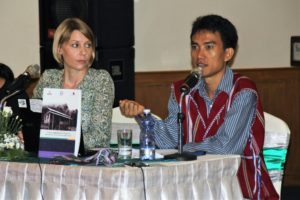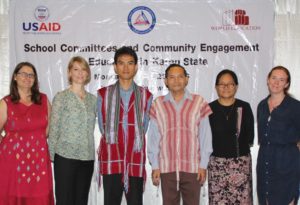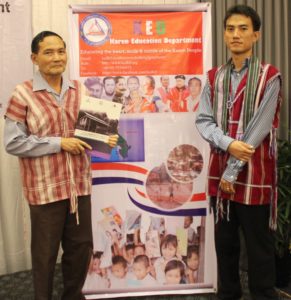
Researcher Anne Decobert and KED Secretary Law Eh Moo speaking at the research launch.
On Monday September 26th 2016, the Karen Education Department (KED) in collaboration with World Education Thailand, launched a research report on ‘School Committees and Community Engagement in Education’ in Yangon.
The KED, established by the Karen National Union to oversee education in Karen State in the 1950’s, currently supports over 167,000 students in 1,500 community schools. Support includes teacher training, curriculum design, administration, policy development, material resources and teacher subsidies. The KED faces considerable challenges to program implementation including social and political instability, outbreaks of conflict, and the displacement of communities in Karen State. The national government does not officially recognize community education systems and their work, and government education programs and systems are rolled out without taking into account existing community systems or preferences. Community teachers are not officially recognized by the Myanmar Ministry of Education (MoE), and are difficult to retain due to low stipends and minimal resources and capacity.

Karen Education Department and World Education celebrate the launch of the report.
Supported by World Education’s Project for Local Empowerment (PLE), a research study was conducted in 2015 to better understand community engagement and the impact it has on education in Karen State as well as factors restricting and enabling local engagement and decision-making. The research report was finalized in 2016 and focuses on the KED’s considerable efforts in addressing local and national challenges through the development of school committees and their support for school administration in Karen State. The study recommends that education providers, the international community, donors, stakeholders, and in particular the MoE ensure conflict sensitivity and sustainable education solutions by holding consultations with communities, school committees, and non-state actors and their education departments. It further recommends that the MoE develop clear policies and guidelines for the official recognition of community schools and commit to supporting alternative or flexible pathways to accreditation and certification for community teachers as well as wider teacher education and management planning.
KED presented the research results and recommendations in a public forum in Yangon, which was well attended by representatives from United States Agency for International Development (USAID), UNESCO, the International Rescue Committee (IRC), Japan International Cooperation Agency (JICA), Childs Dream, Thabyay, Partners Asia, ADRA and the National Network for Education Reform.

KED Chairperson Saw Lah Say and KED Secretary Law Eh Moo at the research launch.
In Myanmar’s evolving political context, an in-depth analysis of community engagement in education is essential in order to better inform local and international efforts to support community ownership and to address needs and obstacles hindering quality and access. Rolling out programming in ways that are not conflict sensitive and that do not involve key community actors can exacerbate tensions, in turn impacting negatively on the peace process. Conversely, processes of constructive engagement can impact positively on peace building, as well as further strengthening community mechanisms for school-based management. This research contributes to a knowledge base that underscores the importance of involving non-state actor and community perspectives in national processes, including education policy development.
The research launch represents an important milestone in raising the voice of ethnic non-state actors who have been providing long-term education support to displaced and conflict-affected children with few learning opportunities. The launch also ensures that PLE ethnic education partners are able to provide input and be included in the education reform currently taking place in Myanmar. This public event also raises awareness of the current work being done by PLE education partners in Myanmar and along the border.
The full report can be found at http://thailand.worlded.org/our-resources
